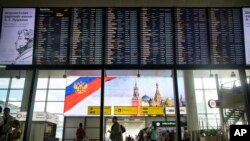A decree banning direct flights between Russia and Georgia, issued by Russian President Vladimir Putin in response to anti-Russia protests in Tbilisi, came into effect on July 8.
The decree also "recommends" that Russia travel agencies stop selling package tours to Georgia for as long as the flight ban remains in place.
The last direct passenger flight between the two countries before the ban took effect was by Russia's Aeroflot airline.
It took off from Tbilisi International Airport during the early morning hours of July 8 and landed at Moscow's Sheremetyevo Airport at around 5 a.m.
The Kremlin has described the ban as "temporary," but the decree does not specify an end date.
That means it is unclear how long the decree will remain in force or how hard it will hit the Georgian economy.
But analysts say if the ban remains in place, Georgia's economy could lose $250 million to $300 million a year.
That's because Georgia has been a popular tourist destination for Russians.
More than 1.6 million Russian tourists visited Georgia in 2018 -- a number that has been steadily rising since the near disappearance of Russian vacationers there immediately after the 2008 Russia-Georgia war.
Data from Georgia's National Tourism Agency shows that each Russian tourist last year spent, on average, about $465 during their visit to Georgia -- injecting more than $720 million into the Georgian economy.
Alternative routes
That's about 10 percent of the entire annual income generated by Georgia's tourism sector.
It has also been estimated that the six Russian airlines that operate flights to Georgia could lose about $48 million in refunds.
The flight ban hasn't made it impossible for Russians to visit their Caucasus neighbor to the south.
Airlines in Armenia, Belarus, Turkey, and Azerbaijan have been offering alternative indirect routes to Georgia.
Russians also can take flights to the Russian city of Vladikavkaz and travel overland via the so-called Georgian Military Road -- a 200-kilometer route that crosses the Greater Caucasus Mountains and connects Vladikavkaz to Tbilisi.
There also has been talk in Tbilisi about the possibility of running shuttle bus services from Yerevan, Baku, and Trabzon in Turkey to help Russian tourists travel to Georgia.
Putin ordered the flight ban on June 21, a day after thousands of Georgians rallied in Tbilisi to express outrage over a Russian State Duma deputy who sat in the chair of the Georgian parliamentary speaker while addressing a gathering of lawmakers from predominantly Orthodox Christian countries.
More than 240 people were injured in that demonstration late on June 20 when Georgian riot police fired rubber bullets and water cannons to turn back crowds who tried to storm the parliament.
Georgian activists and opposition politicians have continued to hold daily protests in front of the parliament since then to demand the resignation of Interior Minister Giorgi Gakharia over the violence.
Many Georgians openly express anger at Russia, 11 years after the five-day Russia-Georgia war that resulted in Russian forces occupying Georgia's two breakaway regions -- Abkhazia and South Ossetia.





